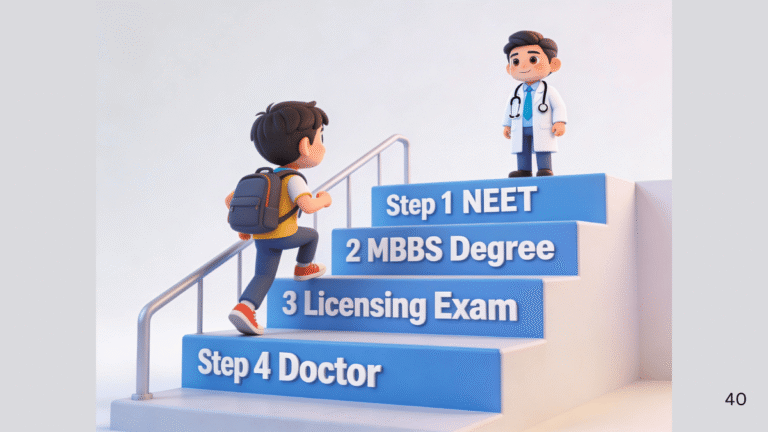Thinking about getting a medical degree overseas? It’s a big decision with many options. Indian students are increasingly looking abroad for top-quality medical education. This guide will help you navigate the process of selecting the perfect country for your studies.
Studying medicine in another country opens up exciting opportunities. You can access world-class universities and state-of-the-art facilities. Plus, you’ll gain valuable cultural experiences.
However, this journey comes with its own set of challenges. You’ll need to understand admission requirements and financial aspects. Let’s explore the key factors that should influence your decision.
Understanding Global Medical Education Systems
Medical education systems differ worldwide. Program length, structure, and language requirements vary across countries. These differences create opportunities and challenges for international students seeking medical degrees abroad.
Differences in Program Duration and Structure
Medical programs can last from 3 to 8 years. In Canada, they typically span 3 to 5 years. India’s MBBS program requires 6 years of study.
Some countries require a bachelor’s degree before medical school. Others allow direct entry after high school. The U.S. and Canada fall into the first category.
Language Requirements and Cultural Considerations
Language proficiency is crucial for international students. Many European universities teach medical programs in local languages. Cultural influences shape medical education in different countries.
For example, China and India emphasize traditional medicine practices. Understanding these nuances is key when choosing a medical program abroad.
Recognition of Medical Degrees Worldwide
The global acceptance of medical degrees is vital for international students. Titles and qualifications may vary across countries. A university’s reputation can affect your ability to practice medicine internationally.
Research the worldwide recognition of a program before enrolling. This ensures a smooth transition to medical practice after graduation.
Understanding global medical education helps students make informed decisions. They can choose the best fit for their academic and professional goals.
| Country | MBBS Program Duration | Entry Requirements | Language of Instruction |
|---|---|---|---|
| Canada | 3-5 years | Completion of a bachelor’s degree | English |
| India | 6 years | Direct entry after high school | English |
| United States | 4 years | Completion of a bachelor’s degree | English |
| Germany | 6 years | Direct entry after high school | German |
| China | 5-6 years | Direct entry after high school | Chinese |
Top Countries for Medical Education and Their Benefits
Medical students have many options for pursuing their healthcare dreams. Several countries offer quality medical education with diverse benefits. These include the UK, USA, Germany, France, Australia, and Canada.
High-Quality Medical Programs in the UK and USA
The UK boasts exceptional medical programs at prestigious institutions. These include Oxford, Cambridge, and University College London (UCL). Tuition fees range from $22,800 to $52,000 yearly. Programs typically last 5 to 6 years.
The USA hosts world-renowned medical schools like Harvard and Johns Hopkins. Tuition fees vary greatly, from $18,000 to $86,000 per year. Program durations span 4 to 6 years.
Affordable Options in Germany and France
Germany and France offer more affordable medical education. German tuition fees range from $138 to $2,200 per semester. The program usually lasts 6 years.
France provides medical degrees with tuition fees between $450 and $1,000 yearly. Program lengths vary from 3 to 8 years.
English-Speaking Programs in Australia and Canada
Australia and Canada appeal to students seeking English-language medical programs. Australian universities like Melbourne and Sydney offer degrees with varied tuition fees. These range from $25,000 to $75,000 yearly. Programs last 5 to 6 years.
Canadian tuition fees can range from $120,000 to $367,000 per year. Program lengths are 3 to 5 years.
Consider program quality, tuition fees, living costs, and cultural fit when choosing. Exploring these destinations can help you find your perfect fit. Start your journey to become a skilled, compassionate healthcare professional.
Choosing Medical University Abroad: Key Factors to Consider
Evaluating various factors is crucial when pursuing a medical degree abroad. These factors can impact your education and future career prospects. Aspiring medical students must consider accreditation, curriculum, and clinical opportunities offered by different universities.
Program accreditation is essential. Look for medical schools recognized by reputable organizations like WHO or ECFMG. These accreditations ensure quality curriculum, faculty expertise, and high academic standards.
- Seek out universities with a long-standing history of at least 25 years, as they often demonstrate a track record of excellence and innovation in medical education.
- Ensure the program duration and structure align with the National Medical Commission (NMC) guidelines, which require a minimum of 54 months of study followed by a 12-month internship.
- Language requirements are crucial, especially for international medical student mobility. Look for institutions that offer English-medium instruction to facilitate your integration and success.
Evaluate the university’s global ranking, research facilities, and alumni network. These provide insights into the quality of education. Consider the country’s healthcare system and post-graduation opportunities.
These factors can significantly impact your future career in global healthcare. Careful consideration will help you make an informed decision. It can unlock doors to cross-border medical training and international medical degrees.
Financial Planning and Investment in Medical Education
Pursuing a medical degree abroad is a major investment. Students must evaluate the financial impact carefully. Tuition fees differ greatly across countries, from affordable options in Germany to pricier ones in the UK and USA.
In the UK, yearly fees for international medical students range from $22,800 to $52,000. USA costs can reach $86,000 per year. Germany offers a budget-friendly choice, with fees between $138 and $2,200 per semester.
Tuition Fees Comparison Across Countries
| Country | Annual Tuition Fees (in USD) |
|---|---|
| United Kingdom | $22,800 – $52,000 |
| United States | Up to $86,000 |
| Germany | $138 – $2,200 per semester |
Living Expenses and Additional Costs
International students must also factor in living costs. Monthly expenses can range from $700 in Germany to $2,000 in Australia. Other costs include health insurance, textbooks, and clinical equipment.
Scholarship Opportunities and Financial Aid
Various scholarships and financial aid options support international students. For example, NSERC scholarships in Canada fund international medical students. Research country-specific financial requirements, like proof of funds for visas.
Explore all available financial assistance options. This helps make informed decisions about funding your medical education.
Consider the financial aspects of international medical education carefully. This helps students plan their educational journey effectively. Understanding tuition fees, living expenses, and financial resources is key.
With this knowledge, international students can manage medical degree costs. They can work towards achieving their career goals with confidence.
Conclusion
Choosing the right country for your medical degree is crucial. It can shape your future healthcare career. The global landscape offers diverse opportunities for Indian students pursuing MBBS dreams.
Educational quality, program structure, and costs are key factors to consider. Language requirements and career prospects also matter. Evaluate these to align your goals with the rewards of an overseas medical degree.
Understanding recognition standards is essential. Research medical education opportunities abroad thoroughly. This helps you make an informed choice for your international medicine career.
Studying medicine abroad requires a comprehensive approach. Consider academic merits, financial implications, and cultural adaptability. Personal and professional growth potential is also important.
By weighing these factors, Indian students can unlock global possibilities. This journey equips them with knowledge, skills, and a global perspective. It prepares them to become future healthcare leaders.





